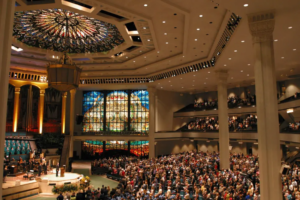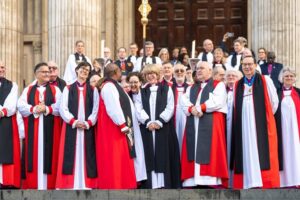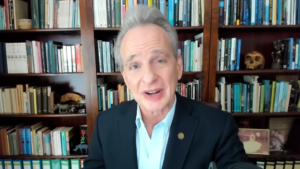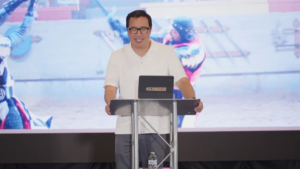(Philip Huber) This year, partnering with Grace Bible Theological Seminary, the G3 National Conference hosted a pre-conference entitled “The Gospel & the State: Christian Nationalism, Theonomy, and Free Church Doctrine.” The main sponsors of the pre-conference were the Family Research Council’s Center for Biblical Worldview and the James Dobson Family Institute.
Dr. Jeffrey D. Johnson, President of Grace Bible Theological Seminary of Conway, Arkansas, was the first of six speakers. A graduate of Veritas Theological Seminary, Dr. Johnson is also the founding pastor of Grace Bible Church of Conway and the owner of Free Grace Press, a Reformed Baptist publisher.
Considering renewed debate on the role of the civil magistrate in enforcing religious conformity, Johnson’s core message focused on the value of Christian liberty and the need to make appeals to the consciences and hearts of believers and unbelievers. He argued that, instead of focusing on the church or nations as a whole, the emphasis should be on personal communion through the Word of God. In other words, we need to recognize the value of the individual and deal with people more as individuals instead of members of larger groups.
In considering the relationship of the Christian to the state, Johnson reminded his listeners that the legal system was eye for eye and, historically, the state has been the chief persecutor of the church. To reinforce this point, he read from Matthew 10:16-22:
“Behold, I send you out as sheep in the midst of wolves. Therefore be wise as serpents and harmless as doves. But beware of men, for they will deliver you up to councils and scourge you in their synagogues. You will be brought before governors and kings for My sake, as a testimony to them and to the Gentiles. But when they deliver you up, do not worry about how or what you should speak. For it will be given to you in that hour what you should speak; for it is not you who speak, but the Spirit of your Father who speaks in you.
“Now brother will deliver up brother to death, and a father his child; and children will rise up against parents and cause them to be put to death. And you will be hated by all for My name’s sake. But he who endures to the end will be saved.
In its relationship to the state, the church has often found itself in one of three basic stages:
- Banned
- Legalized
- Sponsored
This fundamental pattern has repeated itself throughout history in different contexts.
Initially, Christianity was banned under Emperor Nero following the Great Fire of AD 64. Nero used Christians as scapegoats for the fire and even used Christians as human torches at night.
Even with the legalization of Christianity in AD 312 and the eventual sponsorship of the church by Emperor Constantine, the church still suffered persecution. For instance, the renowned Bishop Athanasius, who propounded an orthodox view of the Trinity, faced repeated exile, once under Constantine and several times under Constantine’s successors.
Eventually, the Roman Bishop Gelasius developed the doctrine of the two swords based on Luke 22:38, with the view that the sacred power of the church held authority over the secular power of the state. To highlight this perspective, Johnson pointed to the historical confrontation between Pope Gregory VII and Emperor Henry IV as well as Pope Boniface VIII and Philip IV of France.
According to the Catholic view, the second sword of the state was to be wielded by the church and on behalf of the church. Far from promoting the interests of Christ and the true church, such intertwined church-state relations resulted in the persecution of Christian groups like the Waldensians, with estimates of at least two million executed for their faith. Overall, some historians calculate that Papists put 50 million Christians to death.
Furthermore, the persecution of Protestants during the Reformation eventually led to the development of the lesser magistrate doctrine and the Magisterial Reformation. During this time, the Reformers had to wrestle with the relationship of local magistrates to the higher authorities and Christians under their charge who needed protection. One of the most perilous issues involved the role of the civil magistrate in religious matters.
Initially, Martin Luther was for preserving liberty of conscience. Dr. Johnson pointed to three critical works Luther produced during this time on church-state relations:
- On the Freedom of a Christian
- An Open Letter to the Christian Nobility
- On Worldy Authority
At this time, Luther argued for freedom of speech with heresy restrained by arguments. In contrast to Gelasius, Luther argued that, ultimately, God was over both the church and the state.
Unfortunately, Luther’s position shifted after he and Philip Melanchthon encountered the Zwinglians and anabaptists in Germany. Luther would largely turn against the idea of religious liberty after the Peasant’s War of 1524 to 1525.
Tensions between Luther and the followers of Zwingli grew as Luther wished to avoid being labeled as a seditious rebel. In Switzerland, for example, followers of Zwingli began to ignore the public observation of Catholic Lent by eating sausages. One such follower named Klaus Hottinger even kicked over a crucifix in the Swiss canton of Zurich and was banished before eventually being executed in Catholic Lucerne.
Meanwhile, Protestant Pierre Viret of French-speaking Switzerland became one of the early advocates for the Christian magistrate as the ideal magistrate. It was also in Switzerland where Sebastian Castellio, who had met Calvin in Geneva, became one of the earliest advocates for religious toleration.
Later, in the English-speaking world, John Cotton and John Owen became proponents of Congregationalism and gradually worked toward religious toleration. Unfortunately, the early Magisterial Reformation often led to the persecution of dissenting religious groups by civil magistrates. For example, in Puritan New England, the civil magistrate often arrested Baptists.
Roger Williams was a noted early Baptist in America and a strong advocate for religious freedom whose views resulted in banishment from his pulpit in Salem, Massachusetts. Ultimately, these men and their fight for freedom of conscience influenced Enlightenment thinkers like John Locke who, in turn, had a profound impact on our Constitution.
In closing, Johnson emphasized that “Christian doctrine should impact our nation” and “Christian liberty is a foundational doctrine.” In light of the shaky nature of church-state relations throughout history, Johnson warned of running to the state to build the kingdom of God.
Note: This article was re-published in its entirety with the permission of Philip Huber. Subscribe to his substack here.























2 responses to “The Gospel & the State: Dr. Jeffrey Johnson”
None of what was written there in the summation is necessarily biblical. It’s a certain view of history (there are others), and the doctrines of Enlightenment era Liberalism that has led the United States of America being in such a godless shape that it is. Too much individualistic Pietism and Quaker ideology. Sorry, but the summation of the history of Christ’s Church in history is poor imo. Roger Williams fell away from the faith and is not a good poster boy for religious liberty. I suppose this group is good with allowing Satanic Temples and Mosques with witches cursing sitting Presidents. How is God honored in that ? In fact, he judges nations for that and will hold us accountable for approving that in our hearts and minds. John Locke’s philosophy is hardly a standard for Christians to live by.
Did…… you know you can burn more fat by doing a “deep cleanse” first thing in the morning?
The best part is that it just takes 13 seconds! It’s here—-𝙬𝙬𝙬.𝙜𝙚𝙩.𝙨𝙖𝙡𝙖𝙧𝙮49.𝙘𝙤𝙢